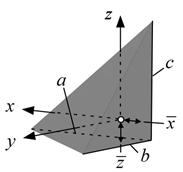
MOI_RightTetrahedron

This procedure returns mass and moments of inertia of a right tetrahedron.
Inputs
a = length of base in x-direction [m, ft]
b = length of base in y-direction [m, ft]
c = length of base in z-direction [m, ft]
rho = material density [kg/m^3, lbm/ft^3]
Outputs
m=mass [kg, lb_m]
I_x = moment of inertia about the x-axis [kg-m^2 or lbm-ft^2]
I_y= moment of inertia about the y-axis [kg-m^2 or lbm-ft^2]
I_z = moment of inertia about the z-axis [kg-m^2 or lbm-ft^2]
x_bar = distance from centroid to flat surface perpendicular to x-axis [m or ft]
y_bar = distance from centroid to flat surface perpendicular to y-axis [m or ft]
z_bar = distance from centroid to flat surface perpendicular to z-axis [m or ft]
Example:
$Load Mechanical Design
$UnitSystem SI K Pa
$VarInfo I_x units=kg-m^2
$VarInfo I_y units=kg-m^2
$VarInfo I_z units=kg-m^2
a = 0.25 [m]
b = 0.7 [m]
c = 0.4 [m]
rho=990 [kg/m^3]
Call moi_righttetrahedron(a, b, c, rho: m, I_x, I_y, I_z, x_bar, y_bar, z_bar)
{Solution:
m = 11.55 [kg]
I_x= 0.2815 [kg-m^2]
I_y= 0.09637 [kg-m^2]
I_z = 0.2393 [kg-m^2]
x_bar = 0.0625 [m]
y_bar = 0.175 [m]
z_bar = 0.1 [m]
}
Reference: Gray, G.L, F. Costanzo, R.J. Witt, and M.E. Plesha, Engineering Mechanics: Statics and Dynamics, Third Edition, McGraw Hill, (2023).